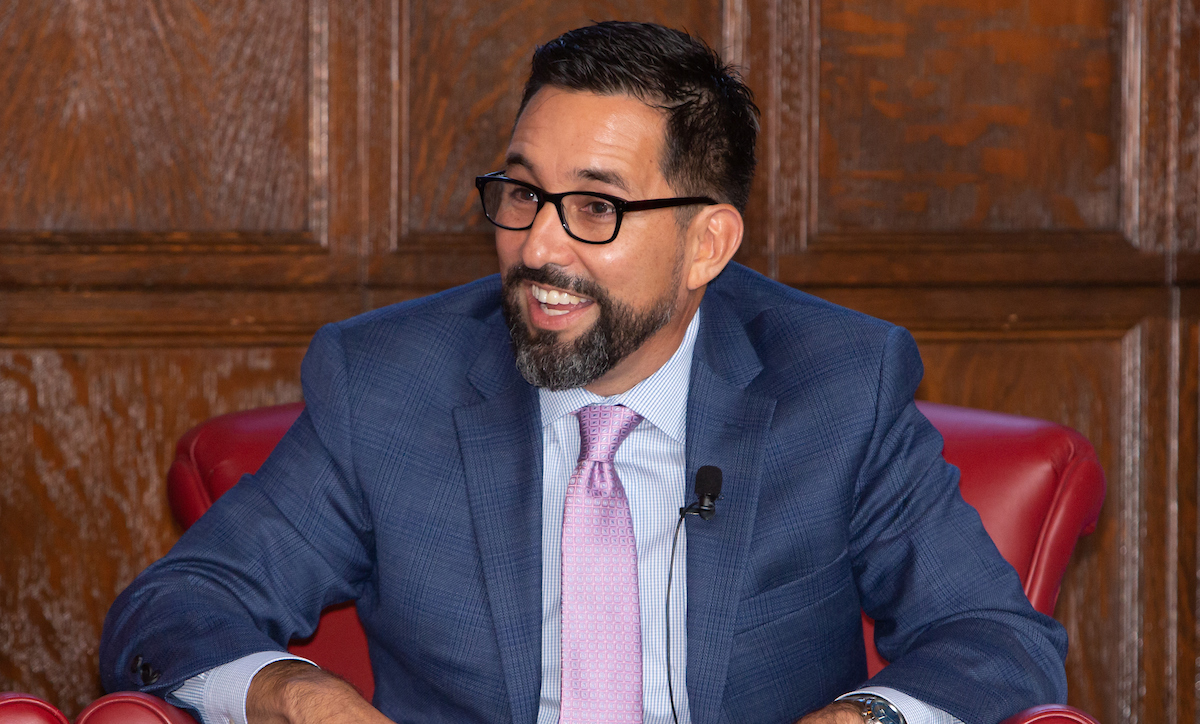 Christopher Tirres in 2019 at the unveiling of The Grace School for Applied Diplomacy. (DePaul University/Randall Spriggs)
Christopher Tirres in 2019 at the unveiling of The Grace School for Applied Diplomacy. (DePaul University/Randall Spriggs)
Christopher Tirres has witnessed faith and diplomacy in unexpected places, from a memorial garden in El Paso, Texas, to an immigrant detention center outside Chicago. As the Inaugural Endowed Professor of Diplomacy and Interreligious Engagement in The Grace School of Applied Diplomacy, Tirres studies how communities and people of faith come together to make change.
“Human action and creativity are so central to any meaningful discussion about faith. Many folks approach faith in terms of having correct ‘beliefs.’ While belief is always part of the mix, the true test of faith has more to do with the work of human hands and hearts,” Tirres says.
Recently, Tirres has examined faith and grassroots diplomacy in the wake of gun violence in his home town of El Paso. He has also taken stock of the vital role of community engagement in his teaching in Chicago.
Faith-in-Action in El Paso
Tirres’ interest in engaged forms of faith was nurtured by the “culturally affirming and theologically rich” environment of El Paso. Like so many others, he was devastated to learn on Aug. 3, 2019, that a gunman had killed scores of people in his home town. The mass shooting, which targeted Mexicans and Mexican Americans, eventually left 23 people dead and 23 injured.
 Christopher Tirres and colleagues from an educational delegation pose in front of a mural by celebrated El Paso artist Jesús “Cimi” Alvarado. (Photo courtesy of Ryan Christopher Jones)
Christopher Tirres and colleagues from an educational delegation pose in front of a mural by celebrated El Paso artist Jesús “Cimi” Alvarado. (Photo courtesy of Ryan Christopher Jones)
In the months that followed, Tirres took note of how El Pasoans responded to this tragedy. Instead of succumbing to hate, the community found ways to remember the victims, support one another, and advocate for racial and immigrant justice. The city also created a memorial Healing Garden. On the second anniversary of the shooting, Tirres returned to El Paso with a delegation of educators to bear witness to the community’s efforts to heal.
“Governmental officials in El Paso and Ciudad Juárez have promoted healing on both sides of the [U.S.-Mexico] border through formal diplomatic channels. But there are also significant forms of grassroots diplomacy happening at the level of community activism, education, art, music, public vigils, and the creation of murals and symbols,” Tirres says. What he saw on the ground soon became part of his teaching and advocacy.
Working with honors students and participating in DePaul’s Social Justice Teach-In, Tirres has highlighted the various ways in which El Paso has responded to racialized violence. He examined the power of various rituals and symbols as well various expressions of "acompañamiento" — solidarity and presence — that community members showed to each other and to the grieving families.
“It’s powerful to see the many ways in which spirituality abounds in this remarkable city. Institutional religion and government certainly play an important role in the work of healing, but so, too, do everyday expressions of solidarity and spirituality,” Tirres notes.
Community engagement with intention
Closer to his current home in Chicagoland, interreligious diplomacy touches Tirres’ life both in and out of the classroom. For five years before the onset of COVID-19, he volunteered with the Interfaith Community for Detained Immigrants, a group with Catholic roots that provides assistance to people going through immigration detention and deportation.
Before the pandemic, Tirres took students in his Latinx Religious Experience class to an immigration detention facility in suburban Broadview to witness one of ICDI’s weekly interfaith vigils. Outside of the facility, students gathered alongside family members who came to say goodbye to their loved ones who were about to be deported. Students also observed how community members and leaders from different religious traditions came together to participate in these vigils.
“This on-site experience helps students to appreciate that spirituality is not something that is simply internal,” Tirres observes. “Rather, they see how people from different walks of life can externalize their spirituality by working together to address pressing social problems.”
Assessing the impact of these experiences on students is important to Tirres. Along with co-author Melanie C. Schikore, former director of ICDI, he published research in the journal “Metropolitan Universities” that explores how encounters with detained immigrants can affect the faith journeys of students and volunteers.
Looking ahead at collaboration
At DePaul, Tirres connects with like-minded DePaul colleagues through his work with the Center for Religion, Culture, and Community; the Council for Community Engagement; and the newly formed DePaul Migration Collaborative. This year, three more faculty members have been named endowed professors in The Grace School: Valerie Johnson in urban diplomacy, Shiera Malik in open studies, and Phillip Stalley in environmental diplomacy.
“It’s exciting to have colleagues like these and to hear new perspectives,” Tirres says. “Although we may be coming at the question from different angles, I think we would all agree that applied diplomacy is about addressing real-world problems and bringing diplomacy down to earth. When we do this work, we may discover not only a new sense of shared purpose, but also deeper experiences of transcendence and grace.”
For more information about programs and faculty in The Grace School of Applied Diplomacy, visit
http://go.depaul.edu/applieddiplomacy.